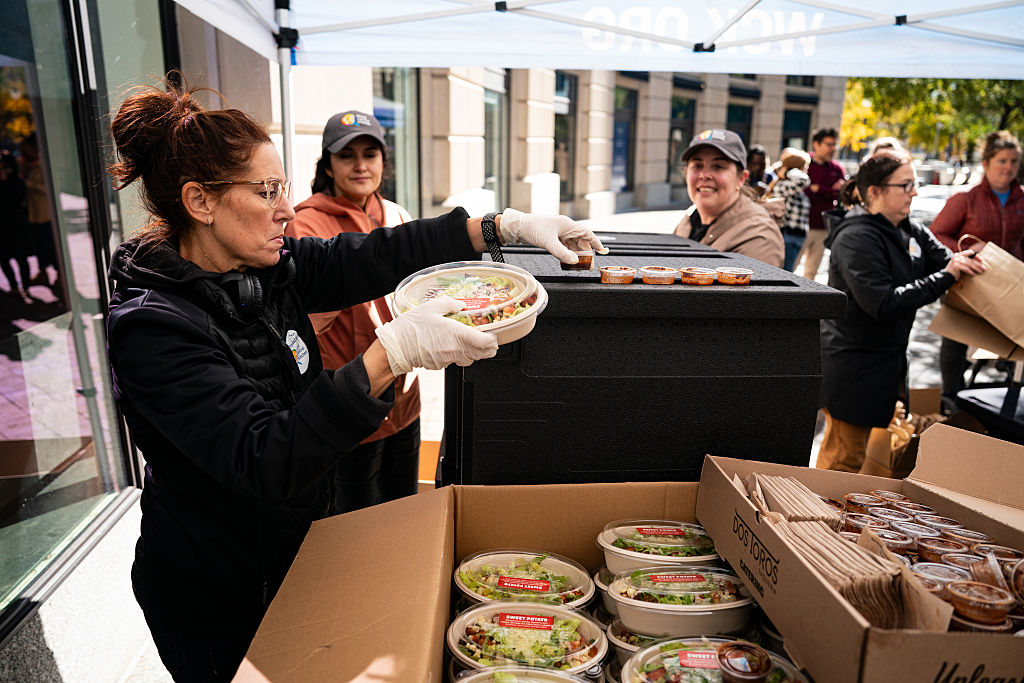The SNAP Freeze Shows Charity Is No Substitute for Welfare
The Trump administration suspended funding for food stamps this weekend, and local food banks are already overwhelmed by hungry Americans — belying conservative arguments that private charities can fill the role of the welfare state.

Local food banks are getting slammed by poor Americans who have run out of food stamps amid the SNAP funding freeze. (Al Drago / Bloomberg via Getty Images)
Funding for the Supplemental Nutrition Assistance Program (SNAP) expired on Saturday amid the government shutdown, putting an estimated forty million people at risk of going hungry. Already the news is full of stories about local food banks getting slammed by poor Americans who have run out of food stamps. And predictably, a lot of these private charities are already failing to meet the demand. A story from Florida is typical:
Community Cooperative had to turn away about 75 people after serving nearly 200 families due to running out of food, although their main market remains stocked. CEO Stefanie Ink Edwards said, “It’s heartbreaking. We never want to turn anybody away to say we’re out of food or we can’t help you. . .”
NBC reports another episode in Arizona:
Lt. Col. Chuck Fowler of the Salvation Army said the organization’s facilities have already begun to notice a high demand for help. After being open for about 90 minutes, one facility closed its doors and turned people away “because we ran out of food that day,” he said.
And in North Carolina, yet another church-run food bank is struggling:
Mount Zion Pastor Rodney Freeman said that Bountiful Blessings has been running out of food in recent months, and they’ve had to turn away an average of 30 to 40 cars a week.
In all of this coverage, one thing you won’t find is a food bank worker who is surprised by this outcome. Still, this is the opposite of what capitalist discourse in the United States would lead one to expect. In that narrative, the private sector is much better suited to feed the poor than state welfare programs could ever be. They’re more efficient, more localized, and best of all: they don’t rely on taxes. For this reason, the private sector should be more than able to pick up the slack of the government shutdown.
The Left has a lot of objections to this of course, and one of their most compelling is the capacity problem. After all, Americans already give a lot to charity, yet the government still has to spend around a trillion dollars on poverty programs. But that shouldn’t be a problem, according to Cato Institute senior fellow Michael Tanner, since pointing at that deficit
ignores evidence suggesting that, in the absence of government welfare programs, private charitable giving will almost certainly increase. Numerous studies have documented a “displacement effect,” whereby government programs crowd out private giving.
To corroborate this, Tanner points to a study which observes that as government poverty programs expanded in the twentieth century, private poverty programs declined. While this shows that there may be a displacement effect, this does not show that but-for public programs, private charity will cover the costs of poverty. And in fact, the historical record shows otherwise: until the 1940s, the United States’ poverty rate typically hovered well above 50 percent.
In any case, SNAP’s funding lapse has provided the perfect opportunity to test this supposed “displacement effect” — and so far, the results aren’t looking good. One may object that the private sector needs more time to take over the state’s responsibilities, but the public had plenty of notice that a funding lapse was possible. Moreover, one of the chief advantages of private charity is supposed to be its efficiency: as Tanner puts it, “few successful charities have the burdensome bureaucratic infrastructure of government programs.”
Setting this initial failure aside, capitalists seem optimistic. Writing for the Daily Signal, for example, senior editor Tyler O’Neil sets expectations:
I’d humbly suggest that private charities and policy nonprofits team up to replace the program with a privately funded alternative that also helps recipients go from dependency to self-sufficiency . . . I already live in an America where generous people contributed so that nonprofits have $4.1 trillion in revenue. This massive charitable sector should be able to address a problem like food stamps. . .
Best of luck to O’Neil, but let’s take this experiment seriously. If the private sector does indeed launch a program that provides the same benefits as SNAP, and if it can do this reliably for the foreseeable future, then they will have at least addressed the capacity problem. If this does not happen, however, then capitalists like Tanner and O’Neil should acknowledge that the private sector is not up to the task. So far, it’s not looking good.